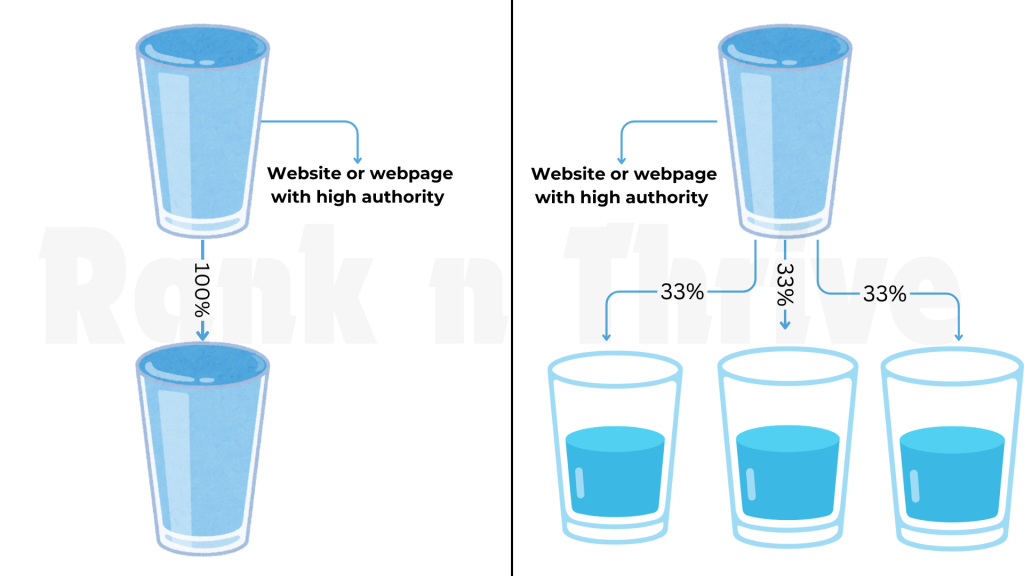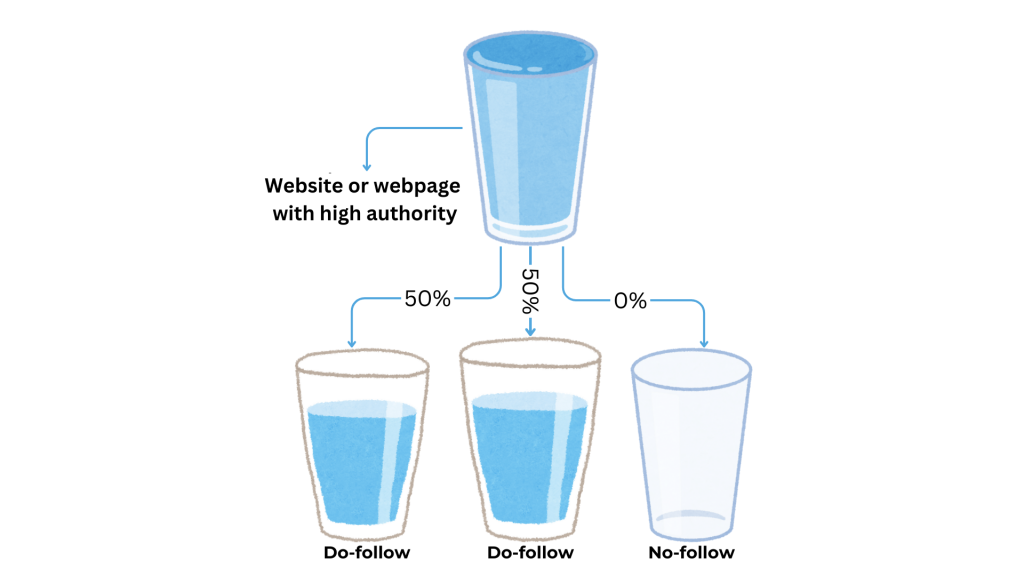What Is Link Juice & How It Impacts In SEO

Why do some pages on your website rank high on Google while others barely make it to the search results? The secret often lies in a concept called link juice. In SEO, link juice plays a vital role in determining how search engines value and rank web pages.
Imagine you’re building a website for your business. Even if you have great content, your pages won’t rank well unless they receive enough authority from links. That’s where link juice becomes essential—it’s like a vote of confidence from other websites to yours. Let’s read below to understand what link juice is and how it works.
What is Link Juice In SEO?
Link juice (also called link equity) is the authority transferred from one webpage to another through hyperlinks. It helps search engines determine page rankings.
Think of link juice like water flowing through pipes. If one website connects to yours, some of its water flows to you, helping your site grow stronger. However, if the same site connects to multiple pages, the water (or link juice) gets divided, and each linked website or page receives less.
To see how internal and external links compare in passing authority, read our detailed article on Internal Link vs External Link.
Link juice is closely tied to backlinks and domain authority. Not all links are created equal, though. A link from a high-authority website (like a major news outlet) passes more link juice compared to a lesser-known or spammy site.
How Does It Work?

Search engines calculate link juice based on several factors, including the quality, relevance, and authority of the linking site. For example, if a reputable site like a government webpage links to your blog, it’s like receiving a huge endorsement. This improves your blog’s credibility in the eyes of search engines.
Here’s how it works:
- Do-Follow Links: Only do-follow links pass link juice. If the link doesn’t have a “rel=nofollow” attribute, it’s treated as a do-follow by default.
- Benefits of Link Juice: When a page receives link juice, its authority increases, improving its chances of ranking higher on search engine results pages (SERPs).
Factors That Affect Link Juice
- Authority of the Linking Page
Webpages with higher domain authority pass more link juice. For instance, a link from a site like Wikipedia carries more weight than a link from a personal blog.
- Relevance of the Content
If a technology blog links to your tech startup’s page, it’s considered highly relevant, and more link juice is passed. Links from unrelated sites—like a gardening blog linking to a tech startup—carry less value.
- Number of Outbound Links on the Linking Page
Link juice is divided among all the outbound links on a page. For example, if a page links to five websites, each site gets only a portion of the available link juice.
- Link Placement
Links in the main content of a page carry more weight compared to links in the footer or sidebar. Search engines prioritize links that are naturally embedded within the text.
- Link Attributes
Attributes like rel=nofollow, rel=sponsored, and rel=ugc influence link juice:
- Nofollow: Prevents link juice from being passed.
- Sponsored: Indicates a paid link, which doesn’t pass SEO value.
- UGC: Identifies user-generated content, like comments or forum posts, limiting the link juice flow.
Link Juice vs. PageRank
PageRank is Google’s algorithm that measures the importance of webpages based on incoming links. While link juice and PageRank are related but they are not same.
Link juice refers to the actual authority passed through links, whereas PageRank is a numerical value assigned to a page based on its link profile. Although Google no longer publicly updates PageRank but the concept remains same in understanding how links impact rankings.
What Makes the Link Beneficial?
Following are the some factors that makes the links juice useful and have its impact on ranking:
- Authority of the Linking Page – Links from high-authority domains pass more value.
- Relevance of the Linking Page – Links from relevant sites in the same niche are more beneficial.
- Type of Link – Do-follow links pass link juice, while no-follow links do not.
- Link Placement – Links in the main content area have a stronger impact than links in the header menu, footer menu or side bar.
- Number of Outbound Links – If the number of links on a page is high then it will pass less juice to each links.
How to Optimize Link Juice for SEO
- Building Quality Backlinks
Focus on earning backlinks from authoritative and relevant websites. For example, guest posting on a popular blog in your niche can help attract valuable backlinks.
- Internal Linking Strategy
Use internal links to guide visitors (and search engines) to your most important pages. For example, if you have a SEO blog post, link to it from multiple articles relevant to SEO topic like “keyword research”, “on-page seo”, “off-page seo” and etc on your site for better internal linking and pass link juice to relevant pages.
- Avoiding Link Juice Leakage
Use rel=nofollow for unnecessary or irrelevant outbound links. For instance, if you’re linking to an unrelated promotional site, nofollow it to prevent losing valuable link juice.
- Using Content Hubs
Create content hubs around key topics. For example, if you run a fitness blog, have a main page for “Workout Routines” and link all related posts back to it. This concentrates link juice on the primary page.
Plugins to Optimize Link Juice
There are some best WordPress plugins that will help you to optimize link juice across your website. These plugins ensure that valuable link juice flows to important pages while preventing unnecessary leakage.
- Yoast SEO – Helps manage internal linking and adds nofollow attributes when needed.
- Rank Math – Provides advanced link control, including internal link suggestions and nofollow options.
- SEOPress – Offers automated link optimization, nofollow management, and redirection control.
- Internal Link Juicer – Automates internal linking and ensures link juice is evenly distributed.
- WP External Links – Controls external links with options for nofollow, noopener, and sponsored attributes.
Myths About Link Juice
- More links always mean better rankings. Quantity doesn’t outweigh quality. A few high-authority links are better than many low-quality ones.
- Nofollow links are useless. While they don’t pass link juice, they can still drive traffic and increase brand awareness.
Summary
Link juice is a critical factor in SEO that determines how authority flows between web pages. By building quality backlinks, optimizing internal links, and avoiding link juice leakage, you can improve your site’s rankings and visibility. Remember, it’s not just about getting links; it’s about getting the right links.
Start implementing these strategies today and watch your website climb the search engine rankings!
FAQS
1. What exactly is link juice in SEO?
Link juice is the value or authority passed from one webpage to another through hyperlinks. It’s like a vote of trust that helps search engines determine which pages deserve higher rankings. The more quality links a page gets, the more link juice it collects.
2. How can I get more link juice for my website?
You can earn more link juice by getting backlinks from authoritative and relevant websites. Focus on creating high-quality content that others naturally want to link to. Guest posting and reaching out to influencers in your niche can also help.
3. Do nofollow links pass any link juice?
No, nofollow links do not pass link juice because they tell search engines not to follow them. However, these links can still drive traffic and improve brand visibility. It’s a good idea to have a mix of both dofollow and nofollow links.
4. How can I tell if a link is dofollow or nofollow?
You can check the HTML code of the link by inspecting it in your browser. If the link doesn’t have the rel="nofollow" attribute, it’s a dofollow link. SEO tools like Ahrefs and Moz can also help identify link types.
5. Does the number of outbound links on a page affect link juice?
Yes, the more outbound links a page has, the more the link juice gets divided among them. A page with fewer outbound links will pass more link juice to each linked page. Prioritize linking only to relevant and high-quality sites.
6. What happens if a high-authority site links to my page?
A backlink from a high-authority site can significantly boost your page’s authority and rankings. It’s like receiving a powerful endorsement that search engines value highly. This can also lead to increased traffic and visibility.
7. How can internal links help with link juice?
Internal links help distribute link juice within your website. By linking to your most important pages, you guide search engines to focus on them. This strategy can improve the rankings of those pages over time.
8. Can sponsored links pass link juice?
No, sponsored links typically include the rel="sponsored" attribute, which prevents link juice from being passed. This is because sponsored links are considered paid endorsements and don’t count as organic votes of trust.
9. How do I prevent link juice leakage?
To avoid link juice leakage, use the rel="nofollow" attribute for links that don’t need to pass authority, like links to unrelated or promotional sites. Focus on linking to high-value pages that align with your SEO goals.
10. Why isn’t my page ranking even after getting backlinks?
This could happen if the backlinks are from low-quality or irrelevant sites that pass little to no link juice. Also, other factors like content quality, page load speed, and user experience might be affecting your rankings. Analyze your backlinks and ensure your page is optimized for SEO.
